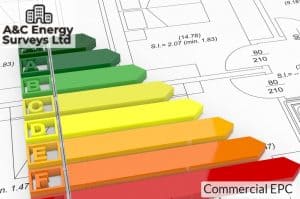When is an EPC required for commercial property?
The Energy Performance Certificate (EPC) is now mandatory for many commercial properties, but what are the important considerations? In this blog post we’ll look at a few of the more common scenarios.

When An EPC Is Needed
There are many reasons why an EPC may be required for commercial property such as:
– A new lease agreement with an existing tenant.
– The landlord wants to sell their commercial property so they want to give potential buyers all available information about its energy usage.
– The owner needs confirmation from an expert on whether their building’s energy use falls within UK standards before installing solar panels.
An EPC will tell you the energy rating of commercial property. The higher this number is, the more energy efficient it is which means that there are big financial savings to be made in commercial buildings where tenants have control over lighting and heating systems.
An EPC is now mandatory for commercial properties. You need an EPC for commercial property if you’re planning on redeveloping the site beyond routine maintenance. This includes all non-domestic and public sector buildings over 500m² (about the size of a football pitch) in England, Wales or Scotland; with some limited exceptions including single dwelling houses where no occupants are renting more than one room, churches, chapels used only for religious services and some commercial properties.
The EPC tells you about a building’s energy performance and is divided into 12 different ratings, from A to G (the lower the rating, the more inefficient it is). The best commercial property will have an EPC rating of C or above. If not, this may affect how much rent can be charged for a commercial property.
A typical EPC will cover all of these things:
– Noise levels – both internal and external
– Dust and smells from machinery
– Waste management &a recycling procedures – Waste disposal procedures – Organic waste disposal mechanisms – Chemical safety practices in laboratory space – Hazardous Materials Storage Procedures – Production Practices Quotas (e.g., square meters per year, production quotas per year) – Air pollutant emissions (e.g., solvent vapours and odours, volatile organic compounds (VOCs), carbon dioxide-equivalent greenhouse gases emitted each year).
If you are in need of a commercial EPC for your building and are in the Nottingham, Cambridge, Peterborough, Northampton or Leicester areas then please call 0800 0588136 or send an email enquiry.